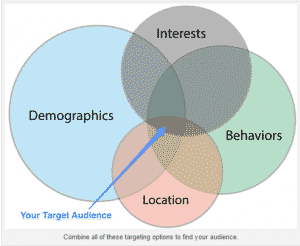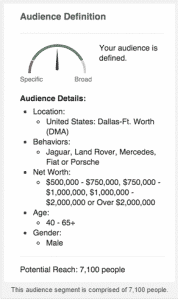If there’s one thing everyone across the generations can agree on, it’s a love of food. Food is not simply about survival but experience; new flavors, excellent service, & a unique atmosphere are all contributing factors to the enjoyment of the dining experience. Despite food’s ability to bring people together, a generational effect is changing the way restaurants reach potential customers. With every new generation comes new expectations that can be tricky for restaurants to navigate.
Reaching these potential customers through ads can be intimidating; there are so many options and qualifications that the main question soon becomes: “How do I even begin to narrow down my audience!?”
Luckily, we’ve done the research. Some of this may be right in line with the generalizations surrounding each generation, others may come as a surprise. Strap in, folks, there’s a lot of data coming at you!
First off, let’s define a couple of things. “Primary needs” top the list of requirements for restaurant-goers; basically, if you don’t meet those needs, you aren’t going to get the customers you need to thrive as a business. “Secondary needs” are not required per se, but they can tip the scale in your favor when potential customers are deciding where to dine.
Every restaurant-goer has these “primary needs”:
- Affordable prices
- Fresh, high-quality food
- Fast & accurate
- Food & experience are worth the cost
“Secondary needs” are divided between the most prominent generations:
Baby Boomers:
- Born between 1947 – 1965
- Currently largest demographic
- New empty-nesters or are contemplating retirement, more time for full-service meals, variety of healthy options (low-fat, low-calorie, low-sodium)
Generation X:
- Born between 1966 – 1972
- Smallest of the three groups
- Group-friendly atmosphere as many have children
- Fun atmosphere with range of adult beverages
Millennials:
- Born between 1977 – 1992
- Will be the largest group by 2030
- Customizable meals
- Group-friendly menu & atmosphere
- Unique foods & flavors
- More diversity, increase in interracial marriage, surge in TV cooking shows, and Internet access has resulted in more exposure to different cultures & cuisines and a higher demand for “Global Food”
- More invested in origin of food
Now let’s talk a little bit about income & spending habits (just not mine); not surprisingly, those with the highest incomes tend to dine out more than those with lower incomes. Also not surprisingly, Millennials are currently making the least amount of dough while Generation X & Baby Boomers typically hang somewhere in the middle. Keep their paychecks in mind while deciding who to target and what will be the most appealing to offer them.
Household Income (HHI) and spending at restaurants:
- 20k – 30k: 30% of food expenditures at restaurants.
- 30k – 40k: 37% “”
- 40k – 50k: 38.5% ‘’”
- 100k – 119k: 45% “”
- 120k – 149k: 46% “”
- 150k and up: 50% “”
And now, a Venn Diagram of ideal targeting goals! Some quick descriptors:
- Demographics: What we’ve been talking about this entire blog, scroll up & re-read as necessary.
- Interests: Things people are, well, interested in. “Healthy eating,” “Fine dining,” etc. You know your restaurant & what interests it meets.
- Behaviors: Things people do. Do they go to BBQ competitions? Probably a good bet they’d be interested in your BBQ restaurant.
- Location: Pretty obvious, keep it local. I’d say a 10-15 miles radius around your restaurant, tops.
Target audience: A visual reference.
At the End of the Day, Intent beats Identity: “Intent” is another word for “purpose” or “goal.” What are your customers looking for and considering when weighing where to eat? Intent can be hard to predict because people are hard to predict (we are complex and fluid creatures, after all). So here are some things to keep in mind:
- A person’s intent while looking for restaurants means more than a generation, economic status, etc. A Baby Boomer may be interested in trying something new, a Millennial may have gotten a new job & be willing to spring for a high-scale meal.
- Don’t rely too heavily on correlations between groups of people and restaurant habits, you may be missing a whole subset of people.
- Inform yourself with data, not stereotypes, & learn from your Facebook Ad Reports.
- Try multiple audiences and see which ones perform the best.
So, quick re-cap in case you tuned out: Baby-Boomers take their time, Generation X likes alcohol, Millennials value diversity. Ok, I’m paraphrasing; the real data lies in your own experience reaching out to your customers & potential customers alike. Just like with everything else, there is no exact formula that equals success, you have to try it out for your own business to see what works. The good news is, you’re restaurateurs! You’re pros at figuring things out for yourself and doing what is best for your business. And if that’s too tall of an order given your workload; you might need to call in the experts.
Sources:
- The Demographics of Flavor: https://goo.gl/gBTJQR
- 38 Staggering Restaurant Demographics: https://goo.gl/oufA0o
- Build a better Target Audience: https://goo.gl/jOUYBy
- Consumer Intent: https://goo.gl/pRq3NO
Did you know?
We've been managing social media accounts for restaurants since 2012. For almost a decade, we've partnered with restauranteurs who are serious about using social media to generate business. Whether you're a good fit for our service or not, let's schedule a call and we'll give you free personalized advice on how to improve your social media presence. Either way, you'll walk away from the call more confident about your ability to promote yourself online - completely for free.


